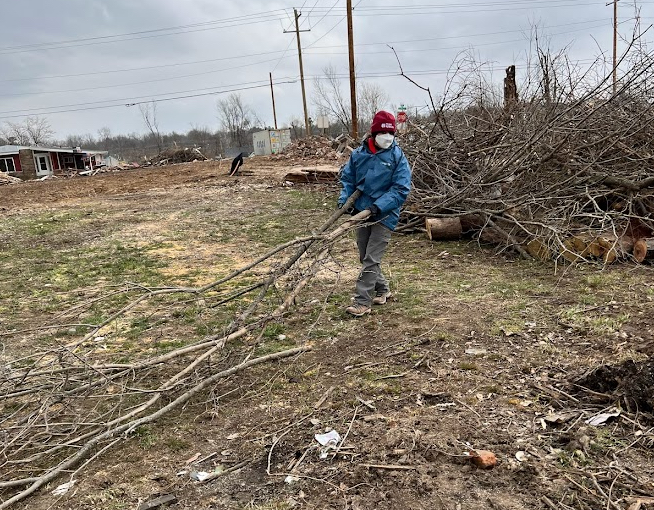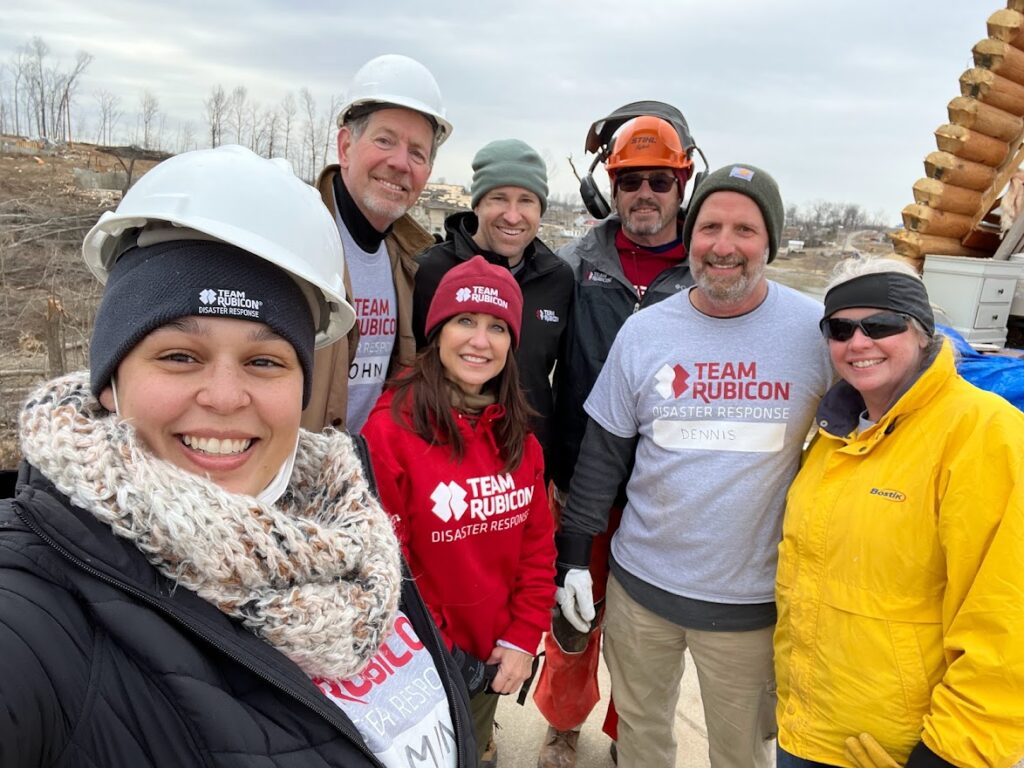Growing up in the South, you learn very early in life to respect Mother Nature. I was born and raised in Atlanta but I moved in 1989 to Sumter, SC, for three years, arriving one week before Hurricane Hugo made its grand entrance on September 22. I was working for a pediatric dentist at the time and recall how, in the months after, children had to be premedicated to have routine cleanings or treatments because the sounds of the dental equipment triggered memories from that horrific night.
Fast forward three decades and to another type of disaster. I was at home in Atlanta when I heard about the catastrophic tornadoes that ripped through Western Kentucky on December 10. It was just weeks before Christmas and my heart shattered for the families. I vividly imagined festive Christmas trees decorated with sentimental ornaments in anticipation of celebration—likely the first time many family members would be getting together since the COVID-19 outbreak began almost two years prior. Underneath those brightly lit trees would lay beautifully wrapped presents that family members anxiously awaited to unwrap. Now, I imagined, all of that gone in the blink of an eye.

This natural disaster hit me differently than other tornadoes and hurricanes that have happened in the recent past, perhaps because of its timing. That series of tornadoes viciously shredded the gorgeous rural Kentucky countryside just two weeks before Christmas, beginning the evening of Friday, December 10 with winds that accelerated up to 190 mph and extended for more than 160 miles across Kentucky.
The families there had very little forewarning about the deadly beast that left a trail of utter destruction over hundreds of miles. Trees snapped like toothpicks, steel was twisted and distorted, bricks were demolished, all as if they had been tossed in the washing machine on the spin cycle. Three months on, we know that a total of 90 lives were lost in the storms and more than 500 people were injured.
Watching the devastation unfold from afar and seeing the images in the news, I couldn’t ignore my desire to figure out some way to help those families. My first thought was to reach out to Team Rubicon—the grey-shirted professionals I’d come to know during my work as a board member with The Warrior Alliance and through my service on the Overwatch Committee at the Arthur M Blank Family Foundation, both veteran-focused efforts—to figure out how they were helping, what they were doing, and where they were serving. How I might join them, and how quickly I could deploy would be my own personal challenge.
I am a civilian and the former wife of a U.S. Air Force veteran. I retired from a career in sales and marketing a few years ago and have since devoted myself to helping veterans live meaningful and purposeful lives once they depart from active-duty military. Because I have worked with a great number of veteran service organizations (VSOs) in metro Atlanta, I was familiar with veteran-led disaster relief nonprofit Team Rubicon, but I had never volunteered with them before. To be completely transparent, everything about a “deployment” was completely outside of my comfort zone.
But then, I thought of those families in Kentucky and set aside my hesitations. I reached out to someone I knew who connected me with Jazmin Marshall, a major gifts officer with Team Rubicon in Atlanta, and suddenly the ball was rolling. Together, we were planning dates to go to Kentucky. She sent me the deployment email and I absolutely panicked: It hinted at communal sleeping areas, early mornings, long days of physical labor, cold temperatures, mobile shower units, traveling by myself, and spending several days with people I didn’t know.
Some people may get excited about the idea of what appears to be “roughing it.” Me? I don’t go camping; I don’t even go glamping! Plus, I am the pickiest eater—I eat like a 10-year-old—so I worried about the whole food situation. But, at the end of the day, I told myself that the men and women whom I represent and support every day in my work with VSOs experience much worse and far more uncomfortable environments. Certainly, I could suck it up for a few days. So, with the help of a dear friend and veteran, I packed the perfect “Go Bag” that contained all the essential gear to help me ensure a comfortable and successful deployment.
In early January, I drove to Mayfield, KY, to meet my teammates for the week. Upon arrival, I walked into the Command Center and was greeted by awesome staff who showed me around and explained everything. The team had two giant monitors set up; one showed current weather where we were working and the other showed weather situations that were taking place throughout the country. Everything was perfectly organized; each person had a specific role and knew his/her respective duties backwards and forwards. The staff was so organized and prepared for anything and everything that could possibly arise.

We headed to the church that so graciously hosted us and met some of our other teammates. We had an amazing food unit leader named Rodney who was amazing!!! He prepared a full-spread breakfast each morning—anything you could imagine. Every meal was deliciously and thoughtfully prepared for everyone. Rodney made sure that he had everything that you might have possibly forgotten available, too. Toothbrushes, toothpaste, shampoo, soap, comb/brush, band-aids, over-the-counter medications, hand warmers—you name it, he was ready. And if he didn’t have something, he would get it for us. This was not the “roughing it” I had imagined.
The first morning of my deployment we departed from the church and headed to our briefing. During our drive to our worksite emotions swelled inside me as I looked out the window and saw piles of debris in the middle of huge, wide-open, beautiful green pastures. The house we were assigned to work at that day will forever live in my mind; every detail about that day will. The smells of debris burning; the chill in the air; the sounds of chainsaws delimbing trees and trucks hauling debris; the emotions I felt for the homeowner whom I was fortunate enough to meet and talk to.
As we stood next to the kitchen sifting debris together in hopes of finding some sentimental remains, that homeowner began describing how she and her mom were in their home when the tornadoes came through. They had hidden in the basement as this beast ripped the house apart above them. It completely tore off the top floor. It stripped down all but one wall on the main floor, but then, thankfully, spared the brick walls in the basement where the women were sheltering and praying for their lives. The one wall on the main floor still remaining was now leaning on a young girl’s bedroom furniture set on one side of the house and pushing the refrigerator forward on the other end of the house.
I truly can’t imagine losing everything. Every single thing. Working on that home and talking with the homeowner is certainly a day I will never forget. I think about her and that home every day and realize how quickly life can change—how drastically life can change. And now, how getting some perspective really can define lives like mine. Put yourself in the shoes of those families—or better yet, stand side-by-side with them sifting through debris for family keepsakes—and you can’t help but see a bigger picture.
Deploying with Team Rubicon was truly one of the very best experiences of my life. It was 100% worth every moment of pre-anxiety I had. I met some incredible people whom I keep in touch with and hope to serve with on future deployments.
Yes, on future deployments.
As much as I don’t wish horrific natural disasters such as this on any person, place, or thing, I also know they will happen. Now, when one does next arise, I hope to have the opportunity to put on my grey shirt and join my friends at Team Rubicon. I want to step out of my comfort zone again to, as the Greyshirts say, Get $hit Done.
Every now and then, we need to do something to reignite our mind and our spirit. For me, that usually involves a beach chair and ocean waves. This was way out of my comfort zone, but exactly what my mind and spirit needed. One of my favorite quotes says it perfectly, “A ship in harbour is safe, but that’s not what ships are built for.” We are built for so much more. And while I’ve known that for so long, actually leaving that safe harbor this time helped me further define my purpose. I hope others like me will also be able to get into service and, in doing so, find purpose of their own.



